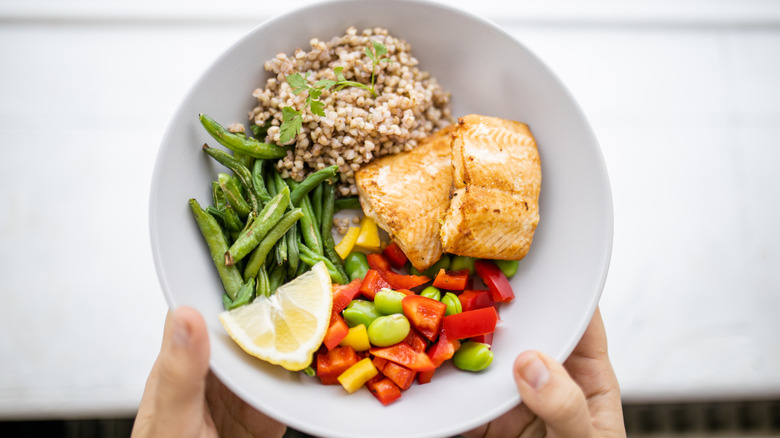Is It Ever Okay To Eat A Meal Without Protein? We Asked A Nutritionist
When it comes to protein, one of the three macronutrients our body needs, more often than not, we hear why we need more of it. Proteins are, after all, referred to as the building blocks of life. If you lead an active lifestyle, you're definitely going to need more protein.
But is it ever okay to consume a meal without protein? According to registered dietitian and co-founder of Culina Health, Tamar Samuels, speaking exclusively with Health Digest, you could technically skip protein in one meal, mainly because you can make up for it with other meals and snacks that contain the nutrient throughout the day. That being said, "protein is an essential macronutrient that serves as the fundamental component for our hormones and neurotransmitters. It plays a vital role in maintaining, repairing, and building muscle, as well as supporting the health of our hair, skin, and gut," explained the expert.
Of course, how much protein you should consume depends on things like your sex, age, and activity levels, shared Samuels. "Although many individuals meet their protein requirements through a balanced diet rich in protein sources like eggs, poultry, fish, meat, and dairy products, certain individuals may require additional protein." For instance, there are health conditions that might benefit from a high-protein diet. Speaking of health conditions and protein, what about low-protein diets?
Who can benefit from a low-protein diet?
"Unless you have specific underlying health issues, your body can effectively absorb most of the protein you can consume at any given meal," explained Tamar Samuels.
Low-protein diets to manage underlying health issues do exist. They have to be carefully managed and preferably monitored by a healthcare professional, but genetic conditions that impact protein metabolism, like homocystinuria and phenylketonuria, might require low-protein diets. Additionally, kidney disease (that results in a buildup of urea in the bloodstream), liver issues, and even diabetic nephropathy are health conditions that could benefit from low-protein diets.
That being said, it is generally not recommended that healthy individuals go on low-protein diets. A lot of things can happen to you if you're not getting enough protein — you might experience mood changes; hair, nail, and skin issues; fatigue; wounds that don't heal fast enough; and a compromised immune system, to name a few. But sometimes, even without you noticing, you may not consume enough protein — maybe you were so busy at work that a fruit salad was your lunch today. What should you do when this happens?
Rounding out your nutrition if you skip protein in a meal
According to registered nutritionist Tamar Samuels, if you find that you've unintentionally (or intentionally) skipped protein at one meal, rounding out your daily nutritional needs is as simple as adding a source of this macronutrient to your other meals and snacks during the rest of your day.
As for the protein sources, they can be eggs, poultry, fish, meat, and dairy products, explained the expert. If you're not a fan of animal-based protein, there are also protein sources that aren't meat like tofu, nuts, seeds, and legumes.
Also, it might be helpful to try and incorporate protein into all your meals. Samuels recommends the balanced plate method. "Fill 1/4 of your plate with a protein source at each meal and make sure you have a source of protein with your snacks," added the expert. The rest would contain vegetables, fruits, whole grains, and healthy fats.
If you're wondering just how much protein you need in a day, again, as we said before, a few factors go into determining the exact amount. Per the Mayo Clinic, 0.8 grams per kilogram of body weight is a good place to start for an average sedentary adult but this number might increase as you age. If you're interested in learning more about age-specific protein consumption, you can check out "Are You Eating Enough Protein For Your Age?"



